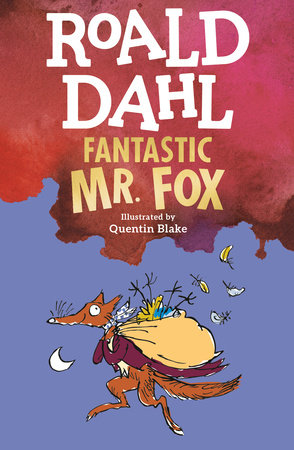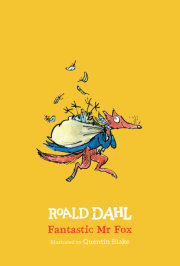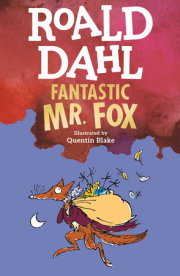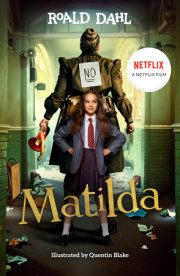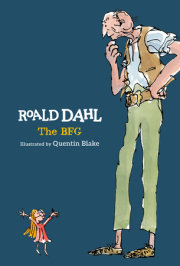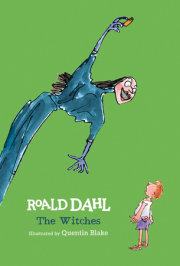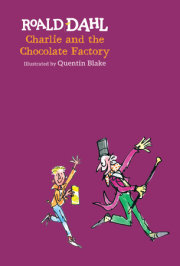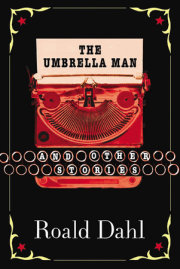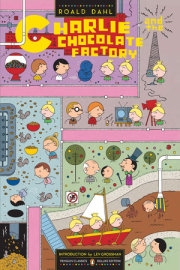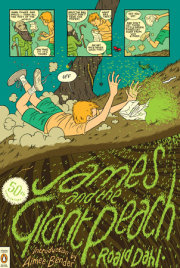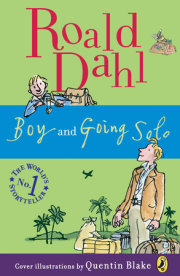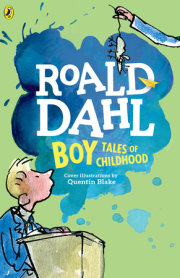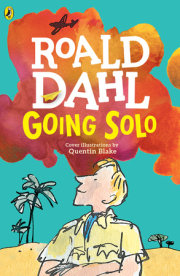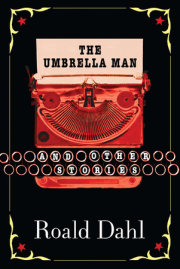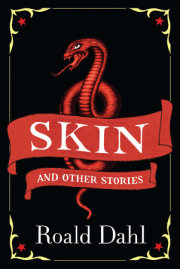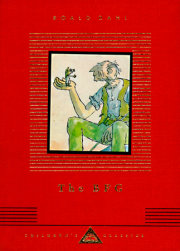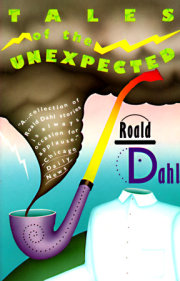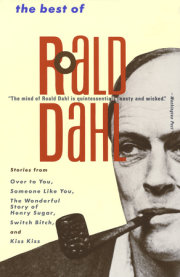1
The Three Farmers
Down in the valley there were three farms. The owners of these farms had done well. They were rich men. They were also nasty men. All three of hem were about as nasty and mean as any men you could meet. Their names were Farmer Boggis, Farmer Bunce and Farmer Bean.
Boggis was a chicken farmer. He kept thousands of chickens. He was enormously fat. This was because he ate three boiled chickens smothered with dumplings every day for breakfast, lunch and supper.
Bunce was a duck-and-goose farmer. He kept thousands of ducks and geese. He was a kind of pot-bellied dwarf. He was so short his chin would have been under water in the shallow end of any swimming-pool in the world. His food was doughnuts and goose livers. He mashed the livers into a disgusting paste and then stuffed the paste into the doughnuts. This diet gave him a tummy-ache and a beastly temper.
Bean was a turkey-and-apple farmer. He kept thousands of turkeys in an orchard full of apple trees. He never ate any food at all. Instead, he drank gallons of strong cider which he made from the apples in his orchard. He was as thin as a pencil and the cleverest of them all.
Boggis and Bunce and Bean One fat, one short, one lean. These horrible crooks So different in looks Were nonetheless equally mean. That is what the children round about used to sing when they saw them.
2
Mr. Fox
On a hill above the valley there was a wood.
In the wood there was a huge tree.
Under the tree there was a hole.
In the hole lived Mr. Fox and Mrs. Fox and their four Small Foxes.
Every evening as soon as it got dark, Mr. Fox would say to Mrs. Fox, “Well, my darling, what shall it be this time? A plump chicken from Boggis? A duck or a goose from Bunce? Or a nice turkey from Bean?” And when Mrs. Fox had told him what she wanted, Mr. Fox would creep down into the valley in the darkness of the night and help himself.
Boggis and Bunce and Bean knew very well what was going on, and it made them wild with rage. They were not men who liked to give anything away. Less still did they like anything to be stolen from them. So every night each of them would take his shotgun and hide in a dark place somewhere on his own farm, hoping to catch the robber.
But Mr. Fox was too clever for them. He always approached a farm with the wind blowing in his face, and this meant that if any man were lurking in the shadows ahead, the wind would carry the smell of that man to Mr. Fox’s nose from far away. Thus, if Mr. Boggis was hiding behind his Chicken House Number One, Mr. Fox would smell him out from fifty yards off and quickly change direction, heading for Chicken House Number Four at the other end of the farm.
“Dang and blast that lousy beast!” cried Boggis.
“I’d like to rip his guts out!” said Bunce.
“He must be killed!” cried Bean.
“But how?” said Boggis. “How on earth can we catch the blighter?”
Bean picked his nose delicately with a long finger. “I have a plan,” he said.
“You’ve never had a decent plan yet,” said Bunce.
“Shut up and listen,” said Bean. “Tomorrow night we will all hide just outside the hole where the fox lives. We will wait there until he comes out. Then . . .
Bang! Bang-bang-bang.”
“Very clever,” said Bunce. “But first we shall have to find the hole.”
“My dear Bunce, I’ve already found it,” said the crafty Bean. “It’s up in the wood on the hill. It’s under a huge tree . . .”
3
The Shooting
“Well, my darling,” said Mr. Fox. “What shall it be tonight?”
“I think we’ll have duck tonight,” said Mrs. Fox.
“Bring us two fat ducks, if you please. One for you and me, and one for the children.”
“Ducks it shall be!” said Mr. Fox. “Bunce’s best!”
“Now do be careful,” said Mrs. Fox.
“My darling,” said Mr. Fox, “I can smell those goons a mile away. I can even smell one from the other. Boggis gives off a filthy stink of rotten chicken-skins. Bunce reeks of goose-livers, and as for Bean, the fumes of apple cider hang around him like poisonous gases.”
“Yes, but just don’t get careless,” said Mrs. Fox. “You know they’ll be waiting for you, all three of them.”
“Don’t you worry about me,” said Mr. Fox. “I’ll see you later.”
But Mr. Fox would not have been quite so cocky had he known exactly
where the three farmers were waiting at that moment. They were just outside the entrance to the hole, each one crouching behind a tree with his gun loaded. And what is more, they had chosen their positions very carefully, making sure that the wind was not blowing from them towards the fox’s hole. In fact, it was blowing in the opposite direction. There was no chance of them being “smelled out.”
Mr. Fox crept up the dark tunnel to the mouth of his hole. He poked his long handsome face out into the night air and sniffed once.
He moved an inch or two forward and stopped.
He sniffed again. He was always especially careful when coming out from his hole.
He inched forward a little more. The front half of his body was now in the open.
His black nose twitched from side to side, sniffing and sniffing for the scent of danger. He found none, and he was just about to go trotting forward into the wood when he heard or thought he heard a tiny noise, a soft rustling sound, as though someone had moved a foot ever so gently through a patch of dry leaves.
Mr. Fox flattened his body against the ground and lay very still, his ears pricked. He waited a long time, but he heard nothing more.
“It must have been a field-mouse,” he told himself, “or some other small animal.”
He crept a little further out of the hole . . . then further still. He was almost right out in the open now. He took a last careful look around. The wood was murky and very still. Somewhere in the sky the moon was shining.
Just then, his sharp night-eyes caught a glint of something bright behind a tree not far away. It was a small silver speck of moonlight shining on a polished surface. Mr. Fox lay still, watching it. What on earth was it? Now it was moving. It was coming up and up . . .
Great heavens! It was the barrel of a gun! Quick as a whip, Mr. Fox jumped back into his hole and at that same instant the entire wood seemed to explode around him.
Bang-bang! Bang-bang! Bang-bang! The smoke from the three guns floated upward in the night air. Boggis and Bunce and Bean came out from behind their trees and walked towards the hole.
“Did we get him?” said Bean.
One of them shone a flashlight on the hole, and there on the ground, in the circle of light, half in and half out of the hole, lay the poor tattered blood-stained remains of . . . a fox’s tail. Bean picked it up. “We got the tail but we missed the fox,” he said, tossing the thing away.
“Dang and blast!” said Boggis. “We shot too late. We should have let fly the moment he poked his head out.”
“He won’t be poking it out again in a hurry,” Bunce said.
Bean pulled a flask from his pocket and took a swig of cider. Then he said, “It’ll take three days at least before he gets hungry enough to come out again. I’m not sitting around here waiting for that. Let’s dig him out.”
“Ah,” said Boggis. “Now you’re talking sense. We can dig him out in a couple of hours. We know he’s there.”
“I reckon there’s a whole family of them down that hole,” Bunce said.
“Then we’ll have the lot,” said Bean. “Get the shovels!”
4
The Terrible Shovels
Down the hole, Mrs. Fox was tenderly licking the stump of Mr. Fox’s tail to stop the bleeding. “It was the finest tail for miles around,” she said between licks.
“It hurts,” said Mr. Fox.
“I know it does, sweetheart. But it’ll soon get better.”
“And it will soon grow again, Dad,” said one of the Small Foxes.
“It will never grow again,” said Mr. Fox. “I shall be tail-less for the rest of my life.” He looked very glum.
There was no food for the foxes that night, and soon the children dozed off. Then Mrs. Fox dozed off. But Mr. Fox couldn’t sleep because of the pain in the stump of his tail. “Well,” he thought, “I suppose I’m lucky to be alive at all. And now they’ve found our hole, we’re going to have to move out as soon as possible. We’ll never get any peace if we . . . What was
that?” He turned his head sharply and listened. The noise he heard now was the most frightening noise a fox can ever hear—the scrape-scrape-scraping of shovels digging into the soil.
“Wake up!” he shouted. “They’re digging us out!”
Mrs. Fox was wide awake in one second. She sat up, quivering all over. “Are you sure that’s it?” she whispered.
“I’m positive! Listen!”
“They’ll kill my children!” cried Mrs. Fox.
“Never!” said Mr. Fox.
“But darling, they will!” sobbed Mrs. Fox. “You know they will!”
Scrunch, scrunch, scrunch went the shovels above their heads. Small stones and bits of earth began falling from the roof of the tunnel.
“How will they kill us, Mummy?” asked one of the Small Foxes. His round black eyes were huge with fright. “Will there be dogs?” he said.
Mrs Fox began to cry. She gathered her four children close to her and held them tight.
Suddenly there was an especially loud crunch above their heads and the sharp end of a shovel came right through the ceiling. The sight of this awful thing seemed to have an electric effect upon Mr. Fox. He jumped up and shouted, “I’ve got it! Come on! There’s not a moment to lose! Why didn’t I think of it before!”
“Think of what, Dad?”
“A fox can dig quicker than a man!” shouted Mr. Fox, beginning to dig. “Nobody in the world can dig as quick as a fox!”
The soil began to fly out furiously behind Mr. Fox as he started to dig for dear life with his front feet. Mrs. Fox ran forward to help him. So did the four children.
“Go downwards!” ordered Mr. Fox. “We’ve got to go deep! As deep as we possibly can!”
The tunnel began to grow longer and longer. It sloped steeply downward. Deeper and deeper below the surface of the ground it went. The mother and the father and all four of the children were digging together. Their front legs were moving so fast you couldn’t see them. And gradually the scrunching and scraping of the shovels became fainter and fainter.
After about an hour, Mr. Fox stopped digging. “Hold it!” he said. They all stopped. They turned and looked back up the long tunnel they had just dug. All was quiet. “Phew!” said Mr. Fox. “I think we’ve done it! They’ll never get as deep as this. Well done, everyone!”
They all sat down, panting for breath. And Mrs. Fox said to her children, “I should like you to know that if it wasn’t for your father we should all be dead by now. Your father is a fantastic fox.”
Mr. Fox looked at his wife and she smiled. He loved her more than ever when she said things like that.
Copyright © 2007 by Roald Dahl; Illustrated by Quentin Blake. All rights reserved. No part of this excerpt may be reproduced or reprinted without permission in writing from the publisher.

